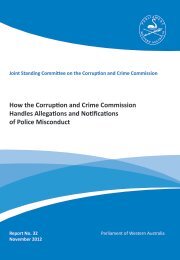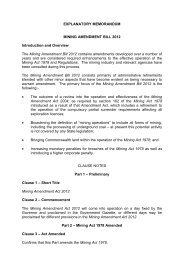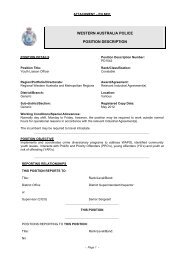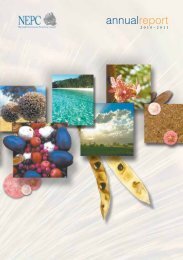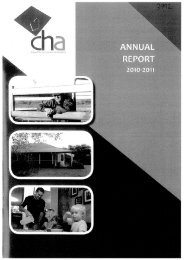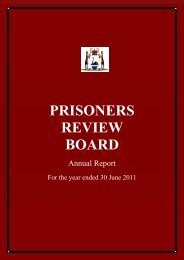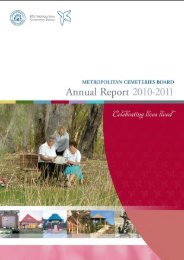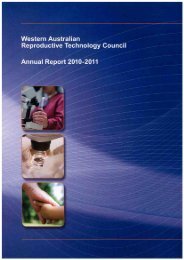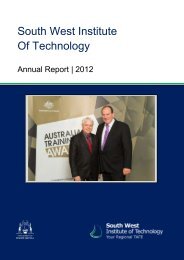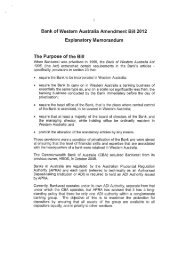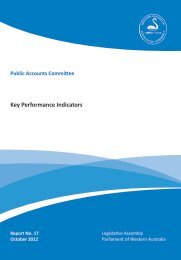Zoological Parks Authority - Parliament of Western Australia - The ...
Zoological Parks Authority - Parliament of Western Australia - The ...
Zoological Parks Authority - Parliament of Western Australia - The ...
You also want an ePaper? Increase the reach of your titles
YUMPU automatically turns print PDFs into web optimized ePapers that Google loves.
<strong>Zoological</strong> <strong>Parks</strong> <strong>Authority</strong> ANNUAL REPORT 2012<br />
Agency Performance – Report on Operations<br />
Directorate Reports<br />
Life Sciences Directorate continued<br />
Perth Zoo has been working with Frankfurt<br />
<strong>Zoological</strong> Society (FZS), the Indonesian<br />
Government and other partners in the Bukit<br />
Tigapuluh region since 2006 to protect the<br />
wildlife and habitat <strong>of</strong> this unique ecosystem.<br />
<strong>The</strong> Zoo provides staff expertise, advice and<br />
funds raised through its Wildlife Conservation<br />
Action program to support the reintroduction<br />
program, an orangutan sanctuary, wildlife<br />
protection units, education programs and<br />
wildlife surveys.<br />
Born at Perth Zoo in 2005, Semeru was chosen<br />
for the release program based on his age and<br />
temperament. He had reached the natural<br />
age <strong>of</strong> dispersal for a male orangutan and<br />
Semeru in the forest in Sumatra<br />
was confident, curious and independent <strong>of</strong> his<br />
mother, all important requirements to adjust to<br />
life in the forest. <strong>The</strong> release <strong>of</strong> Temara in 2006<br />
provided valuable experience for the team <strong>of</strong><br />
Perth Zoo veterinarians and keepers in their<br />
planning and preparations for Semeru.<br />
<strong>The</strong> 12 month-long preparations at the<br />
Zoo prior to Semeru’s transfer included the<br />
introduction <strong>of</strong> Indonesian fruits to his diet,<br />
enrichment items to sharpen his foraging<br />
skills and access to a large fig tree to increase<br />
his fitness and hone his climbing and nestmaking<br />
skills. Approval was gained from the<br />
Indonesian Government to transfer Semeru<br />
to Bukit Tigapuluh in October 2011. He was<br />
released into the forest in November 2011<br />
following two weeks in quarantine. Semeru<br />
was closely monitored by Perth Zoo staff after<br />
his release and two dedicated FZS trackers<br />
continue to track to him daily, monitoring his<br />
movements and behaviours and providing<br />
supplementary food as required. He will be<br />
tracked for around two years. Semeru was<br />
fitted with a radio transmitter implant prior to his<br />
release to assist trackers monitoring him in the<br />
dense terrain. Since his release, Semeru has<br />
made excellent progress adapting to his new<br />
forest environment. His foraging activity, food<br />
intake, travel, nesting and interaction with other<br />
released orangutans is recorded daily.<br />
36<br />
Back in Perth, the Zoo’s renowned Sumatran<br />
Orangutan breeding program produced another<br />
two infants. Sekara (Semeru’s mother) gave<br />
birth to a male, named Sungai, in December<br />
2011 and Pulang (a first time mother) gave birth<br />
to a female, named Lestari, in January 2012.<br />
Lestari was the 29th Sumatran Orangutan<br />
born at Perth Zoo as part <strong>of</strong> the regional<br />
breeding program.<br />
<strong>The</strong>re was also breeding success with another<br />
critically endangered Asian primate species, the<br />
White-cheeked Gibbon. This species is fighting<br />
for survival in the wild with habitat destruction<br />
and poaching for the illegal pet trade the<br />
primary threats in its home range <strong>of</strong> China,<br />
Vietnam and Laos. Perth Zoo has two breeding<br />
pairs <strong>of</strong> White-cheeked Gibbons. In June 2012,<br />
the younger breeding female Jermai gave birth<br />
to her first healthy infant after her successful<br />
pairing with a new breeding male gibbon from<br />
France. Jermai has been a very good first time<br />
mother displaying excellent maternal skills.<br />
In August 2011, there was further good news<br />
with the successful reintroduction <strong>of</strong> the male<br />
White-cheeked Gibbon born to the other<br />
breeding female, Viann. Four-month-old Nakai<br />
was reintroduced to his mother, father and<br />
sibling after being hand-raised by keepers for<br />
the first few months <strong>of</strong> his life when Viann had<br />
difficulties caring for him.



